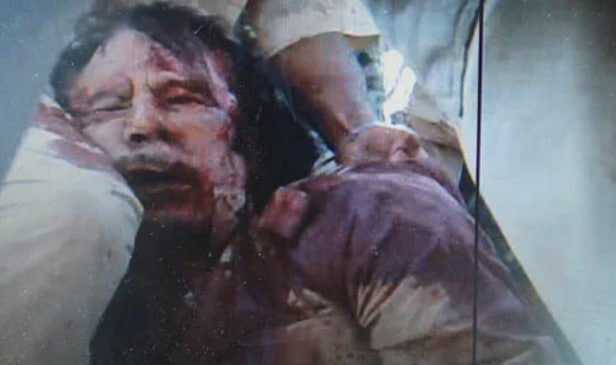
“We came, we saw…he died” boasted a beaming Secretary of State, Hillary Clinton, speaking of the 2011 western overthrow of Libya’s leader Muammar Khadaffi.
She was, of course, shamelessly paraphrasing Caesar’s famous summary of his campaign around the Black Sea. Mrs. Clinton, who seems ordained to be America’s next president, should have been rather more cautious in admitting to murder.
This week marks the fifth anniversary of Khadaffi’s grisly death. The Libyan leader was fleeing in a motor convoy to reach friendly tribal territory when French warplanes and a US drone attacked and destroyed the vehicles. Wounded, Khadaffi crawled into a culvert where he was captured by French and US-backed rebels.
Khadaffi was severely beaten, then anally raped with a long knife. At least two bullets finally ended his suffering. Thus ended the colorful life of the man who wanted to be the second Nasser and leader of a united Arab world. His death was a warnings to others trying to challenge the Mideast status quo I call the American Raj.
I was invited to interview Khadaffi in 1987 at his Tripoli headquarters in the Bab al-Azizya barracks. This was on the one year anniversary of 1986 US air attacks on the barracks that sought to assassinate Khadaffi, described by US President Ronald Reagan as the “mad dog of the Mideast.” But that night, the ‘Leader,’ as he liked to be called, went to his Bedouin tent in the courtyard and thus escaped death – for a time.
A US 2,000lb bomb came crashing through the roof of the barracks right onto the bed where Khadaffi usually slept, often with his two-year old adopted daughter. The girl died.
Khadaffi led me by the hand through the ruined building, asking me “why Mr. Eric did the Americans try to kill me?” I explained to him: his support of the Palestinians, Nelson Mandela, the Irish Republican Army, and Basque separatists. For Khadaffi, they were all legitimate freedom fighters. I rebuked him for not backing the Afghan mujahadin then fighting Soviet occupation who were real freedom fighters.
Khadaffi or at least his intelligence chief, the sinister Abdullah Senussi, was accused of being involved in the downing of a French UTA and US Pan Am airliner. Libya financed anti-French movements in Paris-dominated West Africa and the Sahel.
Chad became a flash-point between Paris and Tripoli. The former head of French intelligence, Count Alexandre de Marenches, told me France’s president, Francois Mitterand, ordered him to bomb Khadaffi’s personal jet, then changed his mind. The British also tried to kill Khadaffi by means of a large car bomb in Benghazi.
Eventually, Libya managed to bury the hatchet with its western foes, though Khadaffi remained highly annoying to the former colonial powers and a fierce critic of the Saudis whom he denounced as thieves of Arab resources and betrayers of the Palestinians.
I’ve often been asked what Khadaffi was like. He was a simple Bedouin born in a tent. Khadaffi was disgusted by the poverty and corruption of the Arab world, and its domination and exploitation by the Americans, French and British. He saw himself as a champion of Palestinian rights, and Libya, with only 6 million people, as the leader of modernized Africa.
But he was also a dreamer who often had fanciful schemes, like the Great Manmade River to draw artesian water from the Sahara. He loved to insult his fellow Arab leaders, branding them cowards, thieves and liars. Khadaffi was theatrical and flamboyant and loved to show off.
After spending an evening with Khadaffi in his Bedouin tent, I told him, tongue in cheek, “Leader, we may bomb you but I must confess our women think you are the most handsome and dashing Arab leader.” He beamed and showed me some of his Italian-tailored faux combat wear and kid-skin jump boots. At times he seemed like a kid in a toy store – zany but also serious and determined. According to his many critics, Khadaffi was a dangerous, anti-western megalomaniac.
He was also vilified and demonized by the western media, a process that happened to all third world leaders who refuse to accept western dictates.
Khadaffi was quietly cooperating with the US when the Arab Spring erupted in Tunisia. Secretary Hillary Clinton and her neocon advisors decided to seize advantage of Mideast turmoil and overthrow Khadaffi.
A new ‘color revolution’ was unleashed by the western powers. Protests were organized in Benghazi, always an anti-Khadaffi stronghold, by CIA, French intelligence and Britain’s MI6. Western special forces attacked Libyan military positions. The UN was gulled into calling for ‘humanitarian intervention to supposedly save civilian lives.’
France led the military intervention. Khadaffi’s son, Seif, had claimed that his father had helped finance French president Nicholas Sarkozy’s election. The vindictive Sarkozy intended to shut up the Khadaffis.
Western special forces intervened behind the cover of a popular uprising. Khadaffi’s rag tag forces quickly collapsed and rebel groups seized power, murdering Khadaffi in the process.
The west got Libya’s high grade oil and was rid of a thorn in its side. Khadaffi told me that if he were overthrown, Libya would splinter into its tribal mosaic – which is just what has happened. Chaos reigns as warlords backed by the US, France, Britain, Italy and Egypt – and a small ISIS contingent – fight over bleeding Libya. Decades of development that made Libya Africa’s leader in health care and education were wiped away.
Interestingly, the template for the western overthrow of Khadaffi – aka “regime change” – was next employed in Syria, with vastly more destructive results but less success. Expect to see more color revolutions when Mrs. Clinton takes over the White House.
Reprinted with author’s permission from his website.

